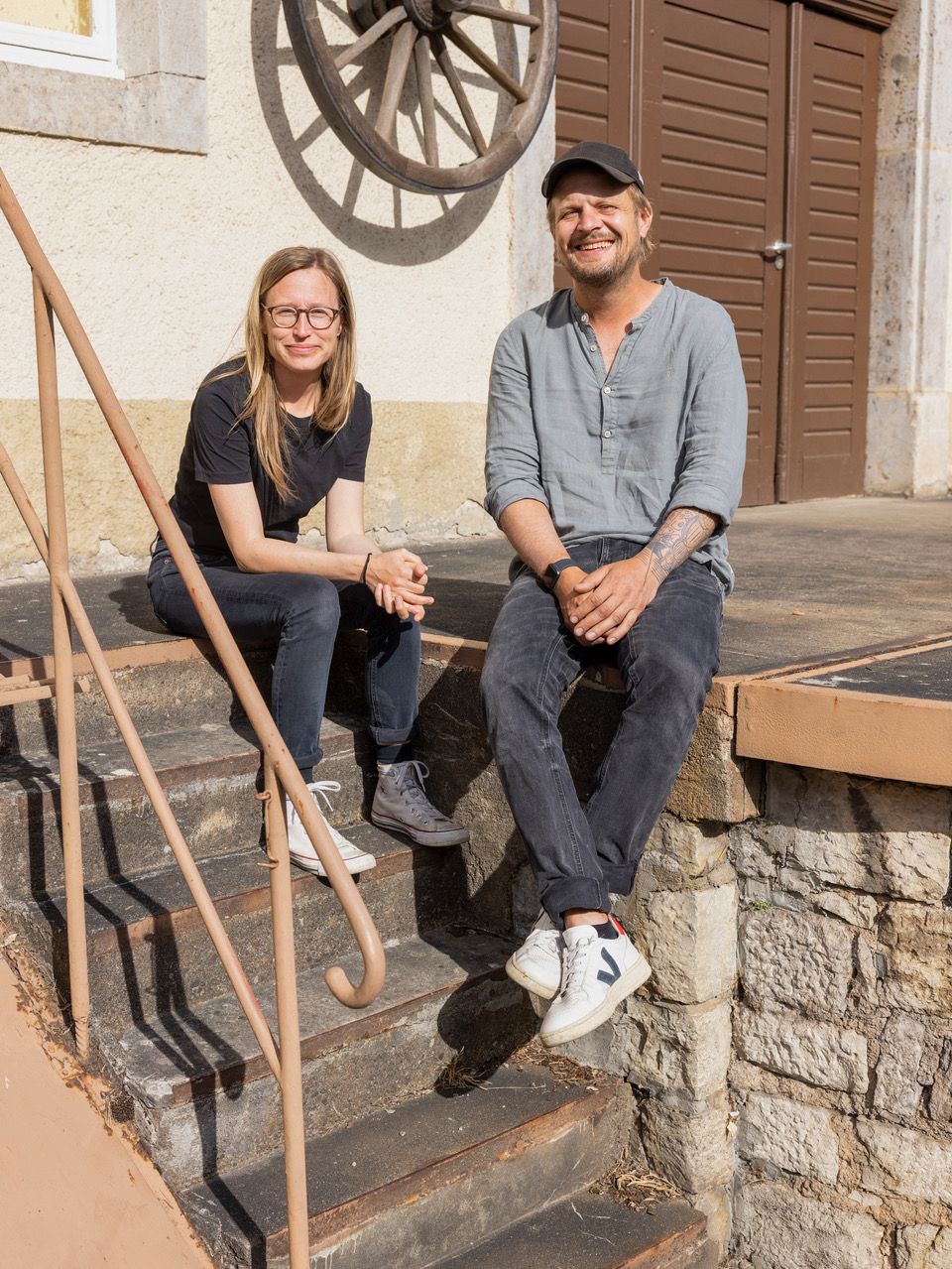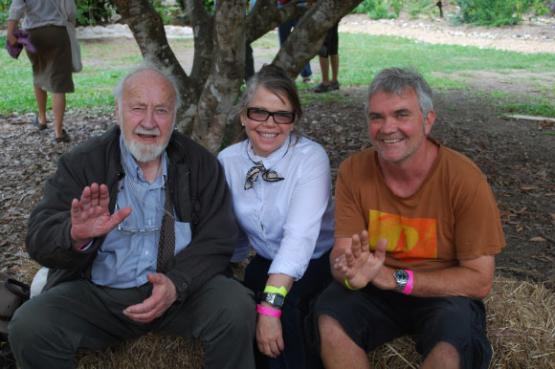
Meet the winemaker: 2NaturKinder
6 min read
2NaturKinder is a winery on the River Main in Franken, Germany that was taken over by Michael Völker and Melanie Drese in 2013. The estate was first established in 1843. Since then, Michael and Melanie have converted to organic agriculture to produce lively and energetic wines that benefit from a healthy soil and biodiverse environment.
We had the chance to catch up with Michael for RAW WINE Club in February 2024. We hope you enjoy our conversation.

Can you tell me about your background - what led you to become winemakers and when and why did you decide to start the winery together?
The winery is roughly 180 years old. It’s an old family winery that was very traditional and conventional before my time. I wasn’t interested in wine at all - it all tasted pretty much the same to me. My parents never encouraged me to continue the business, they actually suggested I think about something else as it wasn’t doing so well. It was pretty big in the 1960s with 40 or so people working here, but it was all built around selling the grapes and that business model wasn’t working that well anymore.
I studied philosophy and, as is often the case when you study something like that, I ended up working in media. I worked for the German edition of Scientific American, where I met Melanie - who has a background in Jewish studies, so neither of us started out in wine. Together, we ended up in London, working for Nature Publishing Group, one of biggest science publishers in the world, in around 2011 when natural wine was just starting in London and when the first RAW WINE took place.
Really very randomly, we started getting a bit more into wine. We lived in Archway and there was a cute little wine shop there. When we were walking home one night, the sales guy asked if we were feeling adventurous, and of course the answer to that question is always yes. They gave us a bottle and it was Pascal Simonutti’s Boire Tue, a reductive red that first puzzled us and second blew us away. We didn’t know why it tasted so different, or even if there was a category this wine fell into. We started digging, trying more wine and going to these events that started popping up where you could learn about wine.
So we discovered natural wine from there and a couple months after, my father called me and said that he needed to start making his plans for retirement and selling the winery. We realized that, in Germany, there was pretty much nothing happening yet except the first vintages of Rudolph Trossen and Stefan Vetter. With a mix of a pioneer spirit and a desire to both keep that old place alive and do something for ourselves rather than working for another billionaire, we decided to quit our jobs and moved back here in 2013. The same year, our first child was born and we made our first 2 small batches of wine from a couple vineyards of around 4 hectares.
I didn’t really know what I was doing, but my dad had a cellar master employed at the time who made his wine and farmed the vineyards, and that was the very beginning of what we do now. With the 2015 vintage, it was clear to us that this might actually work financially. I learned all the technical basics from the cellar master, and they then retired around the same time as my parents. We faded out the old business and downsized the old winery, which has a cellar capacity of around half a million liters, but now we make 40,000 liters.

Where did the name 2NaturKinder come from?
The winery had my family name before me, and is still the legal name of the winery. But it was pretty clear from the beginning that the wine I was making was so categorically different from the rest of the wine, that it would be confusing to have the same name on the bottle. As soon as we had given notice to the company we were working for at the time, we started writing a blog about the whole journey. 2NaturKinder was name of the blog - it means 2 children of nature - so we just went with that, and now we’re kind of stuck with it!
Can you tell me about Franken, and the grapes, climate and traditions that define the region?
Franken isn’t huge. It has roughly 6,000 hectares of vines, so is a little bigger than Chablis - the big toe of Burgundy. But compared to France, everything is very small here. All of Germany is maybe the size of Bordeaux. The bedrock soil types are sandstone, limestone and keuper. Where we are, right in the middle of the region, it’s limestone, some older and some younger. It’s one of the driest regions in Germany, and warmer than others due to climate change. The summers are getting hotter and hotter with less rain, and more rain in winter. For some aspects of winemaking like planting a new vineyard or making big yields, this isn’t a very big advantage. But for wine quality, it’s not bad at all. There’s one variety that stands out in the region, and that’s Sylvaner, followed by not much else to be honest. It’s the main variety of the area.
What's the natural wine scene like now, and how does that differ from when you started out?
From a producer’s perspective, there was a small scene back when I first started. But from a market perspective, there was nothing - it was purely an export business for us. Quite frankly, the first RAW WINE we attended in 2014 was a huge help for us. We went there, came back, and all our wine had sold out. The natural wine scene grew very slowly after that and it was 4-5 years ago that the market started growing a lot more. The cities first, and now smaller towns.
There are quite a few young producers, which is absolutely wonderful, and they start with a lot of the idealism that motivates producers. But there’s a lot of conventional producers who do natural wine alongside their other portfolio, which is very convenient. I remember that when I was first working alongside my old cellar master, if a batch messed up, you could filter it and use it for a conventional blend. That’s where it’s become a little blurry here, with producers just dipping their toes into natural wine.
While there are not many zero zero producers here, it’s definitely grown. I think the next couple of years are going to be very exciting to see unfold. At first, it was almost impossible to get a profile of the country, but now there’s more natural producers, we can start to see differences between the regions. And that’s where it gets interesting from a sommelier perspective.

Can you describe the vineyard and its surroundings?
We have 7.5 hectares and It’s not one big plot, but most of the vineyards are quite close together and reachable by bike. They’re also quite close to the town and sit on 2 small hills. Most of them don’t have neighboring vineyards though, which is nice, they’re surrounded by hedges and trees. If there’s not enough trees, we plant more. 3 years ago we planted a hectare of vines and I found it incredibly depressing to walk through rows and rows of the same thing. We broke it up with 2 huge piles of dead wood that could rot there and provide a home for animals. It also gives you the chance to, instead of starting in row 7 and ending up in row 9, starting at a particular tree and ending at a dead pile of wood where you saw a snake 3 weeks ago. We spend most of our lives in the vineyards, so they should be a joyful place to work in. That’s why we do little things like that to break up bigger plots. It also has an impact on the yeast flora, the grapes, and the stability of the ecosystem.
What grapes go you grow?
A lot! Ha. Our set up wasn’t created from a drawing board. We inherited what we inherited and we started renting other land. We also planted a lot of field blends, so including these, we’ve got somewhere between 25 to 30 varieties. Sylvaner is the most important for us, and it gets on well with climate change and droughts. We also have a bunch of different Pinots that do quite well, and we have a lot of Muller-Thurgau, the bread and butter variety of the country, or central Europe.
Visit 2NaturKinder's RAW WINE profile to learn more about the winery and discover which RAW WINE fairs they're pouring at soon.


